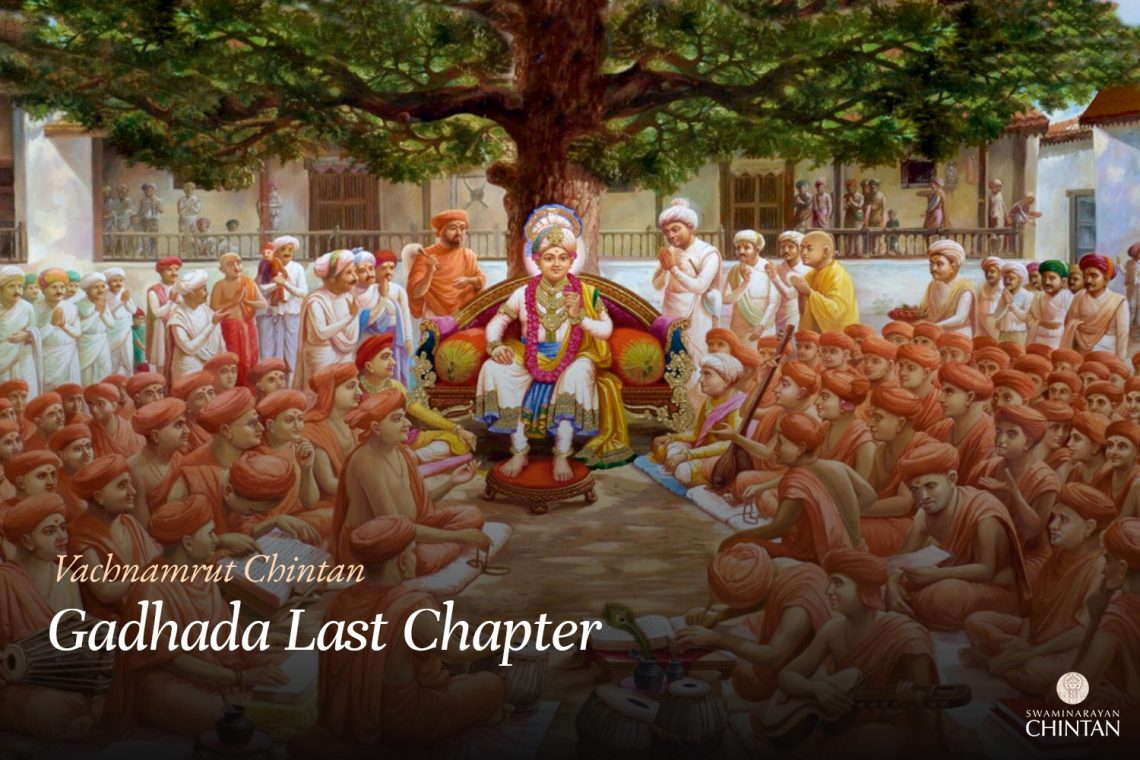Central Insights:
- The friendship between the jeev (soul) and the man (mind).
Key Points:
- Devotion (bhakti) to Bhagwan should never be performed out of jealousy towards other devotees.
- One should not engage in bhakti merely to impress others.
- Devotion should be performed for pleasing Bhagwan and for one’s own liberation.
- If a mistake or offense occurs during bhakti, one should not blame others but instead acknowledge one’s own fault.
Explanation:
This Vachanamrut focuses on the friendship between the jeev and the man. Maharaj explains that the jeev and man are intimate friends—so close that they are entirely devoted to one another. Their friendship is likened to that of milk and water. When milk and water are heated together, water evaporates to save the milk from burning, and the milk boils over to extinguish the fire to protect the water. Similarly, there is such deep friendship between the jeev and the man.
From a philosophical perspective, it is commonly believed that faults and impurities belong solely to the man and the senses, while the jeev remains pure as a chaitanya tattva (conscious entity). Maharaj, however, asserts that such impurities and faults cannot manifest without the contamination of the jeev. Even when jealousy or pretense exists during the performance of bhakti toward one’s ishtadev (chosen deity), the underlying weakness and impurity of the jeev are at play. The subtle intention of the jeev to nurture such inner weaknesses works behind these acts. Bhagwan does not become pleased with such bhakti because His grace is reserved for those with pure intentions, not merely for the actions themselves.
Thus, Maharaj emphasizes that even if someone performs navadha bhakti (nine forms of devotion) such as storytelling (katha), singing kirtans, or listening to divine discourses, but does so out of jealousy toward another devotee, Bhagwan will not be pleased. The reason is that the inner intentions of such a devotee are not pure.
Likewise, one should not perform bhakti merely to impress others. If one does, Bhagwan will not be pleased. A jeev driven by jealousy or a desire for social recognition performs bhakti, satsang, or virtuous deeds to showcase its greatness rather than to please Bhagwan. Maharaj notes that the joy derived from such actions is superficial and does not satisfy the soul as true devotion does. Jealousy, pride, and pretense serve as driving forces behind such endeavors, but they cannot empower the soul to achieve pure devotion.
Maharaj concludes that navadha bhakti should always be performed with the sole aim of achieving personal liberation and pleasing Bhagwan and the true saints.
Another tendency of the jeev is that if any offense or mistake occurs during bhakti, it instinctively places the blame on others, portraying itself as innocent. Maharaj calls this tendency foolishness. The jeev finds satisfaction in portraying itself as faultless, even at the expense of great effort, but it struggles with the effort needed for actual improvement. Maharaj explains this as folly because such efforts do not lead to spiritual progress.
Maharaj further elaborates: “If someone says, ‘I was misled by others,’ or ‘I am not at fault,’ that person is a fool.” Even if someone tells us to jump into a well, we don’t act on their words. Similarly, one’s faults cannot be justified by blaming others. Maharaj explains that such behavior stems from the jeev’s inner impurity, which finds satisfaction in immoral actions caused by maya’s influence.
Lastly, blaming the man or senses alone is also folly. The man and jeev are close friends, and the man never initiates any activity that the jeev disapproves of. It is only when the jeev has a subtle weakness or impure intention that the man indulges in such activities. If the jeev is pure and guiltless, it will neither be swayed by the man nor heed immoral suggestions. For instance, if an inappropriate thought arises, a pure jeev will experience inner pain and ensure such thoughts do not recur.
Therefore, Maharaj concludes that one should introspect and recognize the faults of the jeev, not just the man. By doing so, one will remain untouched by the bad influence of others or the man and can engage in unperturbed worship of Bhagwan.
Glossary
| Jeev – Soul The individual consciousness or self, which is distinct from the body and mind but bound by the influences of Maya. |
| Mana – The mind The inner faculty responsible for thoughts, emotions, and decisions, closely linked to the jeev. |
| Bhakti – Devotion Loving and selfless worship of God. |
| Chaitanya Tattva – Consciousness element The fundamental essence of consciousness, present in Bhagwan and His devotees, representing the divine nature of existence. |
| Navadha Bhakti – Nine forms of devotion The different ways of expressing devotion to Bhagwan, such as Kirtan, Katha, and Mansi Puja. |
| Ishtadev – Chosen deity The personal deity or form of God that a devotee worships and meditates upon, often chosen according to individual devotion. |
| Maya – Illusion The material energy that entangles the Jeev in worldly existence and distracts from Bhagwan. |
| Satsang – Holy fellowship |
| Pretense – Deceptive intention |
| Jealousy – Envy |
| Introspection – Self-examination |
| Liberation – Freedom from the cycle of birth and death |
| Faultlessness – Being free from flaws |

